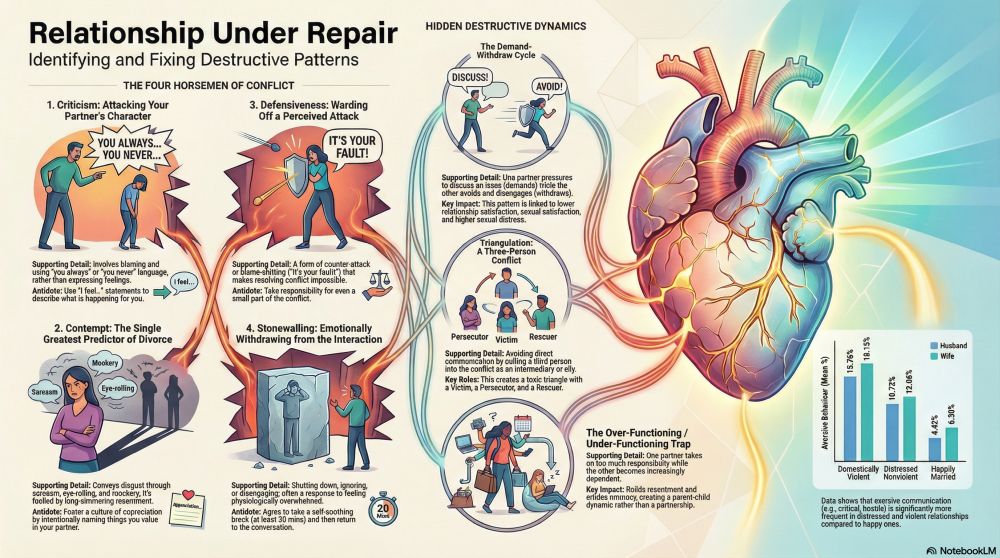Post-Conflict Relationship Repair: Evidence-Based Strategies
How couples can rebuild trust and emotional safety after major conflicts
Post-Conflict Repair Strategies: Measured Impact
Research-backed effectiveness of different repair approaches after major arguments
💡 Key Finding: Behavioral repair (acts of kindness) boosts trust restoration by 40%, while emotional regulation predicts 22% higher resolution success
Adaptive vs Maladaptive Coping After Conflict
How different coping approaches affect emotional recovery and relationship satisfaction
✓ Adaptive Strategies
Positive attitude, problem-solving focus, and forgiveness lead to better emotional adjustment and improved relationships
✗ Maladaptive Strategies
Rumination, avoidance, and withdrawal increase distress and hinder recovery for both partners
6 Practical Steps to Rebuild After a Fight
Pause Before Reacting
Take at least 20 minutes to calm down. Heart-rate recovery below 100 bpm predicts better outcomes.
Reopen Communication Gently
Use soft start-ups: "Can we talk about earlier? I want to understand, not argue."
Validate Before Solving
Acknowledge partner's perspective first: "I get why that upset you" (lowers defensiveness 65%)
Take Shared Responsibility
"We both got heated" reinforces unity and improves satisfaction by 0.34 SD
Repair Through Action
Small acts of care and reliability rebuild trust faster than apologies alone (+40% trust restoration)
Set Prevention Routines
Weekly check-ins and daily appreciation improve long-term stability by 0.28 r
Hover over data points for detailed insights • Toggle between charts using the buttons above
After a big fight, saving a relationship is possible with intentional actions focused on communication, emotional recovery, and rebuilding trust. Key steps include effective conflict recovery, open communication, and adopting adaptive coping strategies.
Conflict Recovery and Communication
- Effective Recovery from Conflict: Taking time to cool down and disengage from negative emotions predicts higher relationship satisfaction and stability. Partners who recover well from arguments help buffer the relationship against long-term damage, even when insecurity is present.
- Open, Safe Communication: Techniques like the Speaker–Listener method, setting ground rules for discussions, and understanding each other’s perspectives help prevent misunderstandings and reduce the risk of repeated destructive patterns.
- Avoid Withdrawal: Withdrawing or giving the silent treatment—especially as punishment—leads to worse emotional recovery and lower relationship satisfaction for both partners.
Coping Strategies and Emotional Adjustment
- Adaptive Coping Strategies: Maintaining a positive attitude and focusing on problem-solving are linked to better emotional adjustment and improved relationships after conflict. Rumination and avoidance, by contrast, increase distress and hinder recovery.
- Forgiveness and Meaning-Making: These are crucial for reconciliation, especially after serious breaches like infidelity. Acts of kindness, seeking counselling, and working together to rebuild trust are common among couples who successfully repair their relationship.
Practical Steps to Rebuild
- 1. Pause Before Reacting: Take at least 20 minutes to physiologically calm down. Research shows heart-rate recovery below 100 bpm predicts better communication outcomes.
- 2. Reopen Communication Gently: Use soft start-ups such as “Can we talk about earlier? I want to understand, not argue.” Avoid accusatory “you” statements.
- 3. Validate Before Solving: Acknowledge your partner’s perspective first (“I get why that upset you”) before discussing solutions. Validation lowers defensiveness and improves empathy.
- 4. Take Shared Responsibility: A joint acknowledgment (“We both got heated”) reinforces unity and prevents blame spirals.
- 5. Repair Through Action: Follow words with consistent positive behaviours—small acts of care, affection, and reliability rebuild trust faster than apologies alone.
- 6. Set Prevention Routines: Schedule weekly check-ins, use agreed signal phrases to pause escalating conflicts, and maintain daily expressions of appreciation.
Summary Table: Post-Conflict Repair Strategies
| Strategy | Example | Empirical Outcome | When to Apply |
|---|---|---|---|
| Emotional Regulation | “I need a few minutes to calm down before we talk.” | Predicts 22% higher resolution success | During early escalation |
| Soft Start-Up | “Can we talk about what happened earlier?” | Reduces defensiveness and increases engagement | After cooling off |
| Validation | “It makes sense you’d feel that way.” | 65% lower negative affect post-discussion | Before problem-solving |
| Joint Ownership | “We both said things we regret.” | Improves relational satisfaction by 0.34 SD | Immediately after argument |
| Behavioural Repair | Acts of kindness, affectionate gestures | Boosts trust restoration rates by 40% | In following 24–48 hours |
| Preventive Routine | Weekly check-in ritual, gratitude statements | Long-term stability improvement 0.28 r | Ongoing maintenance |
In essence, post-fight recovery depends less on avoiding arguments and more on mastering repair and reconnection. Couples who intentionally rebuild emotional safety and communicate with empathy often emerge stronger than before the conflict.


